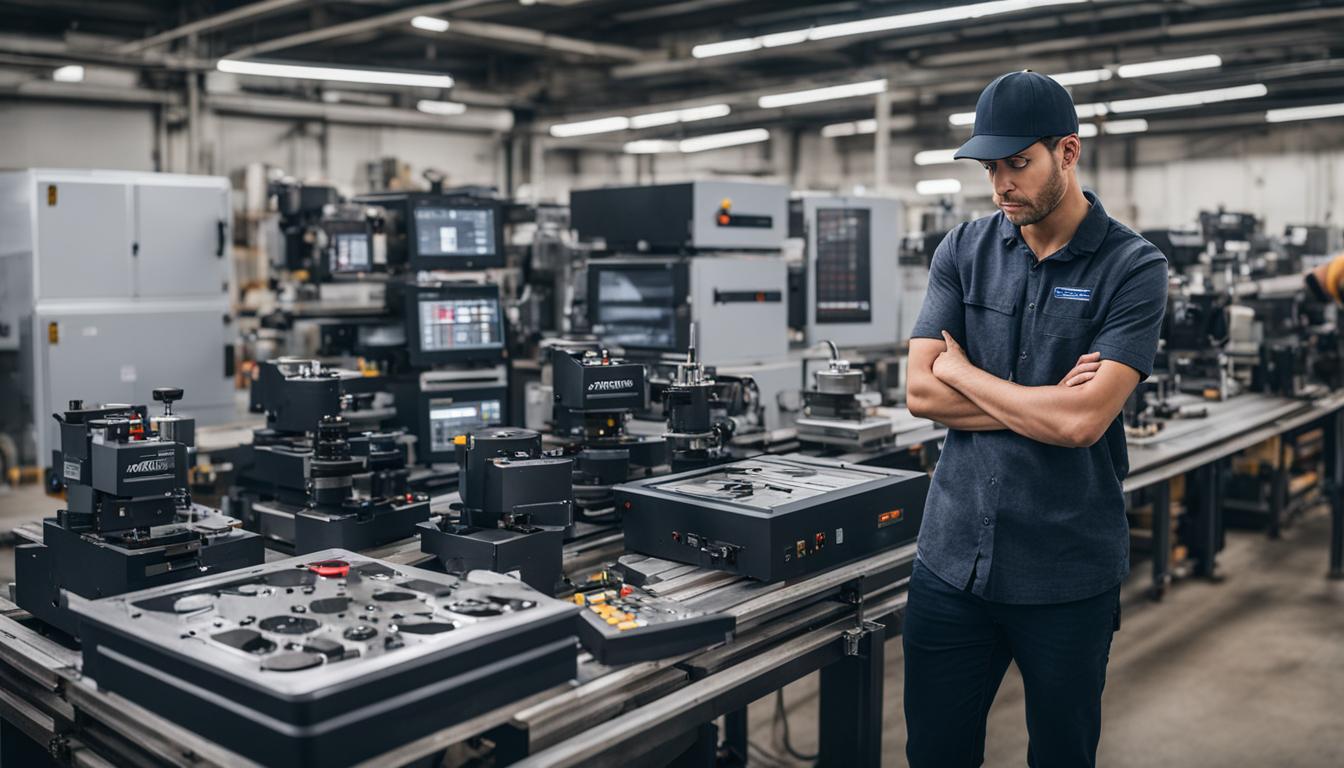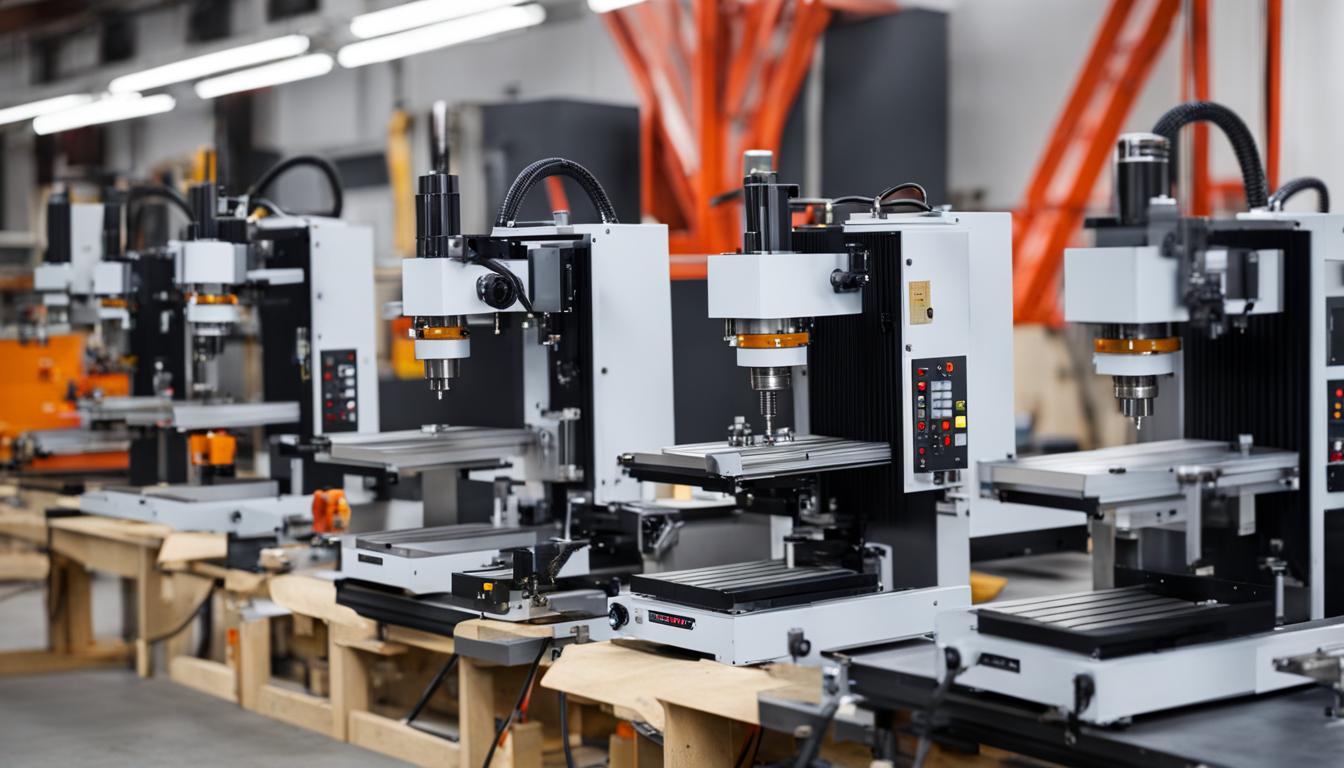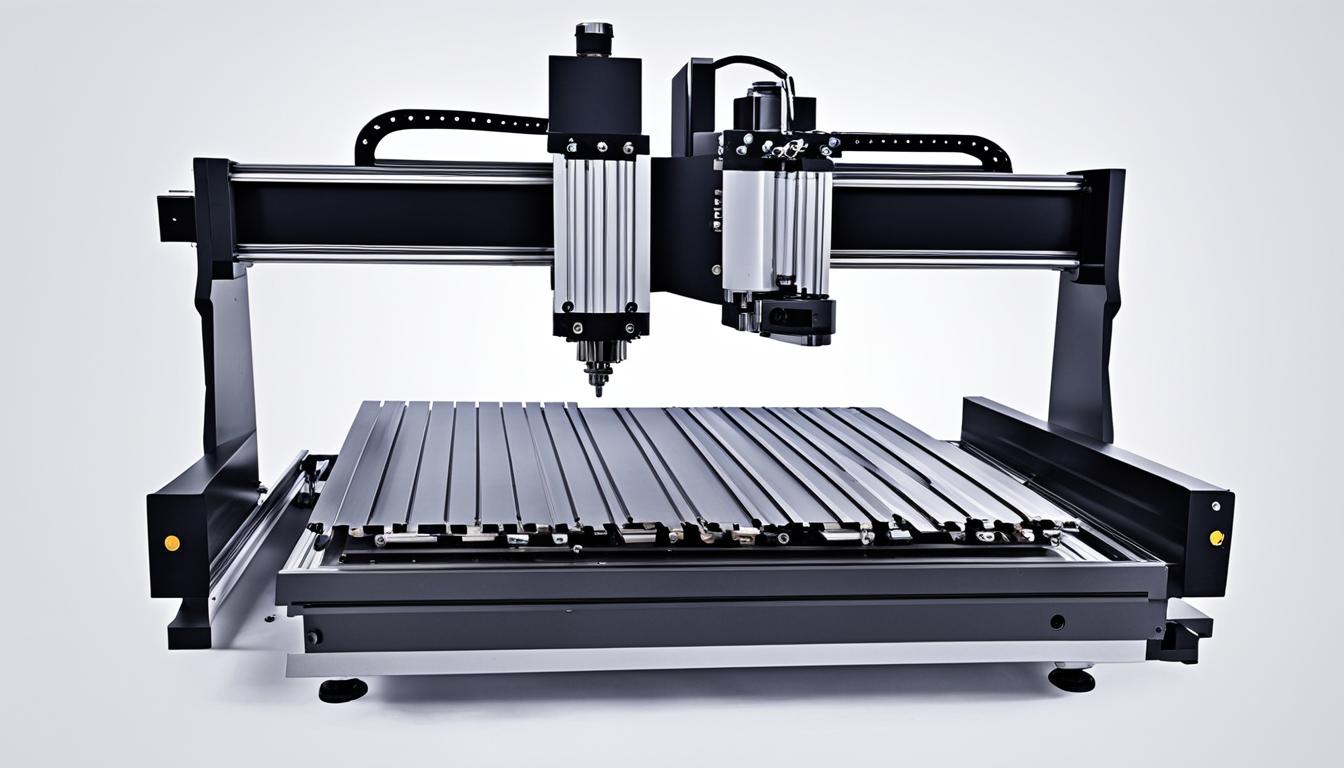The cost of a mini CNC machine can vary significantly depending on various factors. These factors include the type and size of the machine, the complexity of its design and construction, the level of accuracy and precision it offers, the materials it can work with, the brand and reputation of the manufacturer, and the optional features it includes. In general, mini CNC machines can range in price from a few thousand dollars for entry-level desktop routers to several hundred thousand dollars for professional-grade machines. It is important to consider all these factors when determining the right mini CNC machine for your needs and budget.
Key Takeaways
- Mini CNC machine prices can vary depending on various factors such as size, type, and optional features.
- Entry-level desktop routers can cost a few thousand dollars, while professional-grade machines can be several hundred thousand dollars.
- Consider the specific requirements and budget constraints when determining the appropriate price range for a mini CNC machine.
- Other cost considerations include shipping, rigging, tooling, and software.
- Alternatives to owning a mini CNC machine include outsourcing and buying used machines.
Factors that Affect Mini CNC Machine Cost
When considering the cost of a mini CNC machine, several factors come into play. These factors can significantly impact the overall price and should be taken into account when evaluating your budget. Understanding the key factors affecting mini CNC machine cost can help you make an informed decision and ensure that you get the best value for your investment.
Size and Type of Machine
The size and type of the machine play a crucial role in determining its cost. Mini CNC machines come in various sizes and types, such as CNC routers or laser engravers. Larger machines with more advanced features and capabilities tend to be more expensive. Consider your specific requirements and the scale of your projects to determine the appropriate size and type of machine for your needs.
Accuracy and Precision
The level of accuracy and precision offered by a mini CNC machine can influence its cost. Machines that can achieve high levels of precision are typically more expensive. If your projects require intricate details and fine finishes, investing in a machine with exceptional accuracy may be worth considering. On the other hand, if your projects have less demanding precision requirements, a machine with lower accuracy may suffice and be more cost-effective.
Materials Compatibility
The ability of a mini CNC machine to work with various materials can have an impact on its cost. Machines that can handle a wider range of materials, such as wood, plastic, or metal, usually come at a higher price point. If you have specific material requirements, ensure that the machine you choose can accommodate them to avoid any limitations in your projects.
Manufacturer Reputation
The reputation of the manufacturer can also affect the cost of a mini CNC machine. Well-established and reputable brands often charge a premium for their machines due to their track record of producing high-quality and reliable products. While machines from these manufacturers may come at a higher initial cost, they may offer better performance and durability in the long run.
Optional Features
Optional features included with a mini CNC machine can contribute to its overall price. Features like automatic tool changers, coolant systems, or advanced control software can enhance the machine’s functionality and convenience. However, these additional features often come at an extra cost. Consider which optional features are essential for your specific projects and decide if the added cost is justified.
By understanding these factors that affect mini CNC machine cost, you can better evaluate your options and make a well-informed decision. It is essential to consider your specific needs, project requirements, and budget constraints to determine the most suitable machine for your purposes.
Mini CNC Machine Price Range
When it comes to mini CNC machines, the price range can vary depending on the specific type and model. It’s important to consider your requirements and budget constraints when determining the appropriate price range for your needs. Here’s a breakdown of the price ranges for different categories of mini CNC machines:
Entry-level desktop CNC routers:
These machines are suitable for beginners and small-scale projects. They are compact and affordable, making them a popular choice for hobbyists. The price for entry-level desktop CNC routers can range from $150 to $500.
Hobby-grade CNC routers and laser engraving machines:
If you’re looking for a machine with more advanced features and capabilities, hobby-grade CNC routers and laser engraving machines are a great option. They offer higher precision and versatility, allowing for a wider range of applications. The price for these machines typically falls between $1,000 and $3,000.
Professional-grade mini CNC machines:
For those who require industrial-level performance and reliability, professional-grade mini CNC machines are the way to go. These machines are often used in small businesses and workshops that demand a higher level of precision and speed. The price for professional-grade mini CNC machines, such as 2-axis lathes or plasma tables, can range from $1,000 to $5,000.
Higher-end production machines and industrial-grade fiber lasers:
If you’re in the market for top-of-the-line performance and capabilities, higher-end production machines and industrial-grade fiber lasers are the best options. These machines are designed for heavy-duty use and can handle large-scale projects with ease. However, they come at a higher price. The price for these machines can range from $50,000 to over $500,000.
It’s crucial to assess your specific needs and budget constraints when determining the appropriate price range for a mini CNC machine. Consider the complexity and scale of your projects, as well as the level of precision and performance required. By doing so, you can find a machine that fits within your budget while meeting your machining needs.
Cost Considerations for Mini CNC Machines
When determining the cost of a mini CNC machine, it is essential to consider not only the initial purchase price but also other cost factors. These cost considerations can significantly impact the total investment required for owning and operating a mini CNC machine. It is crucial to thoroughly evaluate all these factors to ensure an accurate cost analysis and make an informed decision.
Factors to consider when determining mini CNC machine cost:
- Shipping, Rigging, and Site Preparation Costs
- Tooling and Consumables Expenses
- Work Holding Devices and Inspection Tools
- Software and Training Costs
1. Shipping, Rigging, and Site Preparation Costs:
When purchasing a mini CNC machine, it is necessary to account for the cost of shipping, rigging, and site preparation. These costs can vary depending on the size and weight of the machine, as well as the location of the delivery. It is advisable to discuss these costs with the supplier or manufacturer to get a clear understanding of the additional expenses involved.
2. Tooling and Consumables Expenses:
In addition to the machine itself, tooling and consumables such as lubricants and cutting tools are essential for operating a mini CNC machine. These expenses can add up over time and should be factored into the overall cost analysis. It is crucial to consider the specific requirements of your machining projects and estimate the ongoing expenses for tooling and consumables.
3. Work Holding Devices and Inspection Tools:
Depending on the type of work you plan to carry out with your mini CNC machine, additional expenses may arise for work holding devices and inspection tools. Work holding devices such as clamps, vises, or fixtures are necessary for securely holding the workpiece during machining. Inspection tools, such as calipers or micrometers, may be required for quality control purposes. These expenses should be taken into account when determining the total cost of owning a mini CNC machine.
4. Software and Training Costs:
CNC software is essential for programming and controlling the mini CNC machine. The cost of software can vary depending on the specific requirements and features needed. It is crucial to research different software options and consider the expenses associated with purchasing or subscribing to the software. Additionally, training costs should be considered to ensure that operators are properly trained to use the machine effectively and safely.

By thoroughly considering these cost factors, you can gain a better understanding of the total cost of owning and operating a mini CNC machine. This analysis will help you make an informed decision that aligns with your budget constraints and machining requirements.
| Cost Consideration | Description |
|---|---|
| Shipping, Rigging, and Site Preparation Costs | Expenses involved in transporting, setting up, and preparing the machine’s installation site |
| Tooling and Consumables Expenses | Costs associated with purchasing cutting tools, lubricants, and other consumables for machine operation |
| Work Holding Devices and Inspection Tools | Expenses for acquiring work holding devices and inspection tools necessary for machining operations |
| Software and Training Costs | Costs related to purchasing or subscribing to CNC software and providing training for machine operators |
Mini CNC Machine Alternatives
For individuals or small businesses that may not have the budget or need for a mini CNC machine, there are alternative options available. These alternatives can provide cost-effective solutions without compromising on the quality of CNC machining services. Two popular alternatives include outsourcing CNC machining needs and buying used CNC machines.
Outsourcing CNC Machining Needs
Outsourcing CNC machining needs to a manufacturer can be an advantageous option for those looking to minimize costs and eliminate the need for machine ownership and maintenance. By partnering with a reliable and reputable manufacturer, individuals and businesses can take advantage of their expertise and resources while focusing on their core competencies. This approach allows for flexibility in manufacturing without the upfront investment required for purchasing a mini CNC machine. Outsourcing CNC machining services also provides access to specialized equipment and skilled operators, ensuring high-quality results.
Buying Used CNC Machines
Another alternative is buying used CNC machines, which can offer significant cost savings compared to purchasing new machines. There is a wide range of used CNC machines available in the market, including various types such as CNC routers, lathes, and milling machines. Buying used machines allows for cost-effective access to advanced technology and capabilities. However, it is crucial to thoroughly inspect and evaluate used machines before making a purchase to ensure they are in good working condition. It is recommended to seek expert advice or consult with a reputable seller when buying used CNC machines to make an informed decision.
Both outsourcing CNC machining needs and buying used CNC machines provide alternatives to mini CNC machines, allowing individuals and small businesses to access quality CNC machining services while managing costs effectively.
| Alternative | Benefits |
|---|---|
| Outsourcing CNC Machining |
|
| Buying Used CNC Machines |
|
Tips for Making an Informed Decision
Purchasing a mini CNC machine is a significant investment that requires careful consideration. To ensure you make an informed decision, here are some essential tips to keep in mind:
-
Determine Your Work Requirements
First and foremost, identify the specific type of work and materials you will be working with. This will help determine the appropriate machine size and capabilities needed.
-
Evaluate Available Space and Software Compatibility
Consider the available space in your workshop or workspace to accommodate the mini CNC machine. Additionally, ensure that the machine is compatible with any necessary software applications you plan to use.
-
Calculate Total Cost of Ownership
Look beyond the initial purchase price and evaluate the total cost of ownership. This includes factors such as the initial investment, installation costs, necessary accessories, as well as operation and maintenance expenses.
-
Research Manufacturers
Take the time to research different manufacturers and their reputations. Look for reliable and reputable brands known for producing high-quality mini CNC machines. Customer reviews and testimonials can provide valuable insights.
-
Consider Outsourcing or Buying Used Machines
If budget is a constraint, consider the option of outsourcing your CNC machining needs to a reliable manufacturer. Alternatively, buying used machines can provide cost savings. Just make sure to thoroughly inspect and evaluate any used machine before making a purchase.
By following these tips, you can make a well-informed decision when choosing a mini CNC machine that meets your specific needs and budget.

| Factors to Consider | Importance |
|---|---|
| Work requirements | High |
| Available space | Medium |
| Software compatibility | Medium |
| Total cost of ownership | High |
| Manufacturer reputation | High |
| Outsourcing or buying used machines | Medium |
Additional Costs of Mini CNC Machines
In addition to the initial purchase price, there are several hidden costs associated with owning a mini CNC machine. These additional expenses can impact the overall cost of ownership and should be taken into consideration when budgeting for a mini CNC machine.
Shipping and Rigging
The cost of shipping and rigging a mini CNC machine can vary depending on the size and weight of the machine, as well as the distance it needs to be transported. Shipping fees can range from a few hundred dollars to several thousand dollars, depending on the shipping method and destination. Additionally, the machine will need to be professionally rigged and installed, which can involve additional costs for specialized equipment and labor.
Tooling and Consumables
Along with the machine itself, tooling and consumables are essential for operating a mini CNC machine. These include cutting tools, lubricants, and other materials necessary for the machining process. These costs can vary depending on usage and the specific requirements of the project. It is important to budget for these ongoing expenses to ensure smooth operation of the machine.
Work Holding Devices and Inspection Tools
To properly secure the workpiece during machining, work holding devices such as clamps, vises, or fixtures are required. These devices ensure accuracy and stability during the machining process. In addition, inspection and measuring tools, such as calipers and micrometers, are necessary for quality control and precision. These devices may need to be purchased separately, adding to the overall cost of owning a mini CNC machine.
CNC Software and Training
CNC software is a crucial component of a mini CNC machine, enabling the user to program and control the machine’s operations. The cost of software can vary depending on the complexity and functionality required. Additionally, training may be necessary to effectively operate the machine and utilize its full capabilities. The cost of software and training should be factored into the overall budget when considering the purchase of a mini CNC machine.
Summary of Additional Costs
| Cost Component | Estimated Cost Range |
|---|---|
| Shipping and Rigging | $500 – $5,000 |
| Tooling and Consumables | $200 – $1,000 per year |
| Work Holding Devices | $100 – $500 |
| Inspection and Measuring Tools | $200 – $1,000 |
| CNC Software and Training | $500 – $5,000 |
It is crucial to account for these additional costs when calculating the total cost of owning a mini CNC machine. By considering these expenses upfront, individuals and businesses can make more informed decisions and budget accordingly to ensure a successful and cost-effective integration of a mini CNC machine into their operations.
Conclusion
Owning a mini CNC machine can be a valuable investment for individuals and small businesses alike. By carefully considering factors such as machine type, size, capabilities, and additional costs, it becomes possible to determine the most suitable machine that fits specific requirements and budget constraints. Whether opting to purchase a new or used machine or considering outsourcing, making informed decisions based on thorough evaluation ensures the most cost-effective and efficient solution.
With the right mini CNC machine, individuals and small businesses can achieve their machining needs while minimizing costs and maximizing productivity. Taking into account factors such as machine size, capabilities, and additional expenses allows for a well-rounded understanding of the total cost of ownership. Whether it is a desktop router for hobbyists or a professional-grade machine for industrial applications, a mini CNC machine can provide the precision and accuracy necessary for a wide range of projects.
As technology continues to advance, the cost of mini CNC machines may become more accessible, making them a viable option for even more individuals and small businesses. Understanding the price range, cost considerations, and alternative options provides a comprehensive perspective for making an informed decision. By evaluating the specific needs and budget constraints, individuals and small businesses can confidently choose the right mini CNC machine to support their machining endeavors.
